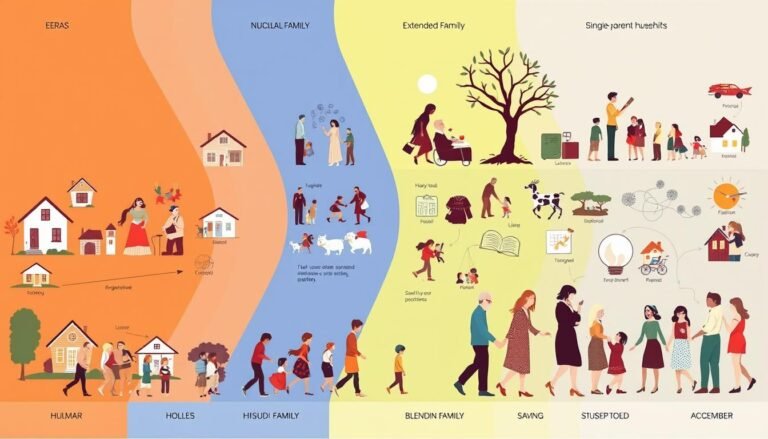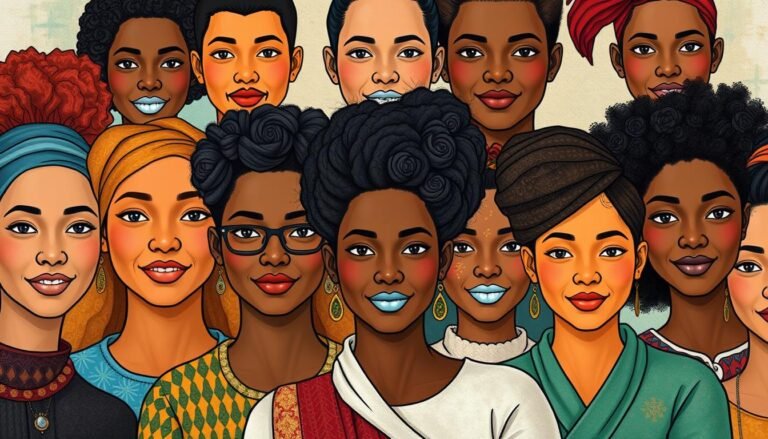The Sociology of Happiness: What Makes Societies Thrive?
Ever wondered why some places seem happier than others? The search for societal happiness has been ongoing for centuries. We’re exploring the world of well-being and life satisfaction to find out what makes societies do well.
Most people are actually happy. Recent studies show that happiness is getting better in many countries. At the same time, happiness differences between people are getting smaller. This goes against the idea that people are unhappy in today’s world.
The study of happiness has a long history. It started in the late 1940s in the USA. Since then, more and more research has been done on it. Now, scientists use big surveys to see how happy people are in general.
What’s really interesting is that things about society explain most of the happiness differences between countries. Things like having a good standard of living, good government, freedom, and being tolerant are key. But, surprisingly, how much money people make and welfare programs don’t really affect their happiness.
Key Takeaways
- Most people report being happy, with happiness levels rising globally
- Societal factors play a significant role in determining overall happiness
- Life satisfaction can be measured through large-scale surveys
- Good governance, freedom, and tolerance contribute to thriving societies
- Income inequality doesn’t necessarily impact average happiness
- Individual life-ability matters more than social position for happiness
- The study of happiness in sociology is growing but still underrepresented
Understanding the Concept of Societal Happiness
Societal happiness is more than just feeling good. It’s about a whole community feeling satisfied and content. This idea has changed over time, affecting how we view progress and success across cultures.
Defining happiness in a societal context
When we talk about happiness in society, we look at more than just smiles. It’s about life being good for everyone. This includes health, money, and how people get along. Social factors play a big role in this bigger picture of happiness.
The importance of collective well-being
Collective well-being is crucial for a happy society. It’s not just about one person doing well. Everyone feeling good together is what matters. This idea has led some countries to explore new ways to measure their success.
“Gross National Happiness is more important than Gross National Product.” – King of Bhutan, 1972
Historical perspectives on happiness in society
The way we think about happiness in society has changed a lot over time. Cultural influences have shaped these ideas. For example, Bhutan started measuring Gross National Happiness in 1972. This inspired other countries to think differently about success.
| Country | Happiness Measure | Year Introduced |
|---|---|---|
| Bhutan | Gross National Happiness | 1972 |
| United Kingdom | National Well-being Program | 2010 |
| Finland | World’s Happiest Country | 2023 |
Today, many countries use different ways to measure how happy their people are. These measures help guide decisions about how to make life better for everyone.
Key Ingredients for a Thriving Society
A thriving society needs health, hope, and harmony. These elements improve life quality for everyone. Positive psychology highlights the importance of mental, emotional, and physical health for happiness.
Work-life balance is crucial for societal happiness. When people enjoy their jobs and have time for hobbies, they’re happier overall. This balance helps build strong community ties.
Good relationships are key to a happy society. Strong social ties offer support, boosting well-being for everyone. Taking care of ourselves and others spreads positivity in the community.
Cultural harmony is also essential. Feeling tied to traditions and the environment makes people feel they belong. This connection leads to a positive outlook and better life quality.
“A society thrives when its members feel connected, supported, and purposeful in their daily lives.”
Recent studies have shown some interesting facts:
- More than 80% of people say they’re pretty to very happy with their lives.
- 80% feel good, scoring 6-7 out of 10 in mood.
- The Steen Happiness Index looks at life’s pleasant, engaged, and meaningful parts.
- The Subjective Happiness Scale is a reliable way to measure happiness.
These studies highlight the need for environments that support well-being. This leads to thriving societies.
The Role of Social Support and Community Engagement
Social networks are crucial for our happiness and well-being. They give us emotional support, help, and a feeling of belonging. These bonds are essential for a healthy society.
Building Strong Social Networks
It’s important to build and keep strong social networks for our happiness. Studies show that close, caring relationships lead to better mental health and longer lives. In fact, being part of a community is more important than smoking or exercising for our health.
Fostering Community Participation
Being part of a community is more than just having friends. It means taking part in local projects and group activities. People who get involved in their communities feel less stressed, have higher self-esteem, and are mentally healthier.
- Active community members tend to live longer, healthier lives
- Community involvement enhances personal growth and skill development
- Collective action addresses local issues more effectively
The Impact of Social Capital on Happiness
Social capital, which includes trust, norms, and networks in a society, greatly affects our happiness. It helps us deal with tough times and grow. Experts now suggest campaigns to improve our relationships to increase well-being.
“Close relationships are not just nice to have, they’re a fundamental human need that promotes thriving.”
By building strong social networks, encouraging community involvement, and increasing social capital, we can make a place where happiness grows. These elements are key to a thriving community and help everyone’s well-being.
Economic Factors and Their Influence on Societal Happiness
The connection between economic factors and happiness is complex. Income and economic growth do help, but their effects are not simple. They can make people feel stressed, anxious, and less in control.
Socioeconomic status affects happiness, but it’s not the only thing. A study looked at over 100 countries and found happiness comes from ‘Health’, ‘Hope’, and ‘Harmony’. Just having more money or a higher GDP doesn’t always make people happier.
In China, the link between income and job satisfaction was small. It only predicted about 5% of job satisfaction. People who thought money was key to happiness were less happy as their income went up.
“Individuals valuing relationships and community over materialistic things had greater job satisfaction and overall life satisfaction regardless of per-capita income levels.”
This shows that being happy comes from meeting needs like autonomy, being part of a group, and feeling connected. The study points out the need for economic growth that looks at both money and other parts of life.
The Sociology of Happiness: What Makes Societies Thrive?
Happiness in society is more than just feeling good. It’s influenced by culture, how well individuals do, and the happiness of a nation. Let’s look at what makes societies do well from a sociological view.
Exploring Cultural Influences on Happiness
Various cultures see happiness in different ways. Some focus on personal success, while others on community unity. These values greatly affect how people see and chase happiness.
The Interplay Between Individual and Societal Well-being
Individual happiness and societal well-being are closely linked. Happy people often give back to their communities. In return, strong societies offer more chances for personal growth and happiness.
“Happiness is not something ready-made. It comes from your own actions.” – Dalai Lama
Measuring Happiness at a National Level
Now, countries track happiness along with economic stats. The World Happiness Report ranks countries by looking at social support, freedom, and trust in government. These stats help leaders make policies for a happier society.
| Country | Happiness Rank | Key Factors |
|---|---|---|
| Finland | 1 | Social support, trust in government |
| Denmark | 2 | Work-life balance, community engagement |
| Switzerland | 3 | Economic stability, natural environment |
Knowing these factors helps build societies where people can really flourish. It’s not just about personal success. It’s about creating a culture that supports everyone’s well-being.
Health and Well-being: Cornerstones of a Happy Society
A strong society needs good health and well-being at its core. Public health efforts are key to making communities happy. Studies show that people who feel good are healthier, live longer, and have better relationships.
Mental health is vital for a happy society. Being positive and not often feeling down makes people happier. By focusing on mental health, we can make our society more positive.
Being physically healthy is also crucial. By promoting healthy living and easy access to healthcare, we can be happier. Yet, even though incomes have doubled in the U.S., people aren’t happier, showing that happiness is complex.
“Happiness is not something ready-made. It comes from your own actions.” – Dalai Lama
By 2040, changes in demographics will affect our well-being. Baby Boomers might move to simpler places as they age. Generation X could head to cities or beyond the suburbs. Millennials will look for meaningful jobs and real connections in cities.
These changes mean we need flexible public health plans. They should help people of all ages and lifestyles stay happy and healthy.
Education and Personal Growth in Thriving Societies
Education and personal growth are crucial for happy, thriving societies. Societies that value learning and growth are more adaptable and innovative. They are also more fulfilled.
The Role of Lifelong Learning
Lifelong learning is essential for societal progress. It helps people adjust to changes and find happiness. Societies that support ongoing education see more happiness and less inequality.
Fostering Creativity and Innovation
Societies that encourage creativity and innovation do better. This leads to new ideas and economic growth. Teaching creativity in schools and workplaces makes society happier.
Developing Emotional Intelligence in Society
Emotional intelligence is key for societal well-being. It helps with relationships and solving conflicts. Schools that focus on both grades and personal growth help societies thrive.
| Factor | Impact on Societal Happiness |
|---|---|
| Lifelong Learning | Increased adaptability, personal fulfillment |
| Creativity | Enhanced problem-solving, economic growth |
| Emotional Intelligence | Improved relationships, social cohesion |
By focusing on these areas, societies can grow continuously. They can become more innovative and emotionally well. This leads to happier, thriving communities.
Environmental Factors and Their Impact on Societal Happiness
A study of 152 countries shows a strong link between environmental quality and happiness. Happy nations often do well in sustainability and recycling. This proves we don’t have to choose between being happy and protecting the planet.
Green spaces are key to well-being. Happy people tend to act more eco-friendly. They feel grateful and want to take care of their surroundings.
This leads to action. Happy folks are more likely to make sacrifices for the planet’s future. They show that joy can drive us to protect nature.
Even very happy people care about the environment and act on it. Happy students also care more about social issues and help their communities. Happiness gives us the energy to make a difference.
These insights offer hope in the face of climate change. They show that happiness can lead to a sustainable future. It’s clear that looking after the environment is key to societal happiness.
Source Links
- Microsoft Word – HappinessOverlooked-ISA2006.doc
- Creating a Happy Society Is More Complicated Than We Think
- Perceiving societal pressure to be happy is linked to poor well-being, especially in happy nations – Scientific Reports
- Maslow’s Hierarchy of Needs and the Five Pillars of Society
- Psychology of Happiness: A Summary of the Theory & Research
- The Importance of Social and Community Participation | Scope Au
- New Look at Social Support: A Theoretical Perspective on Thriving through Relationships
- Health, Hope, and Harmony: A Systematic Review of the Determinants of Happiness across Cultures and Countries
- How Does Valuing Money Affect Your Happiness?
- Why Governments Should Care More about Happiness
- We Need A Sociology of Flourishing
- The Myths and The Conditions About Happiness with Tracy Brower
- Happiness: The Science of Subjective Well-Being
- The Future of Health Promotion in the 21st Century: A Focus on the Working Population
- Agency, Values, and Well-Being: A Human Development Model
- Is Pursuing Happiness Bad for the Environment?
- Happiness Doesn’t Make You Ignore Social Problems







